I'm Glad I Failed In Front of Millions on Shark Tank
Summary: I appeared on Shark Tank, the American adaptation of the business-themed reality television show Dragon's Den, when I was 19. I've spent almost 10 years dealing with that experience and my perceptions of my own failure. Now, though, I'm glad I failed. (2892 words/13 minutes)

That’s me on Shark Tank. It’s episode 12 or 13 of season 1.
When I was 19 years old, I appeared on the American reality television show Shark Tank. The premise is simple: entrepreneurs pitch a hard-boiled set of investors to give them money for a piece of their business. It’s based on a Japanese television show called Dragon’s Den.
I appeared on Shark Tank in 2009. I wasn’t shy about it - it’s been a part of my “bio” for years. What I have been afraid to say to others, though, is that I didn’t have a very good time during or after my appearance. The Sharks didn’t invest in my company, and I endured something of a dressing-down on live television.
The experience deeply affected my psyche in ways I didn’t realize until I had an anxiety attack in an airport 8 years later.
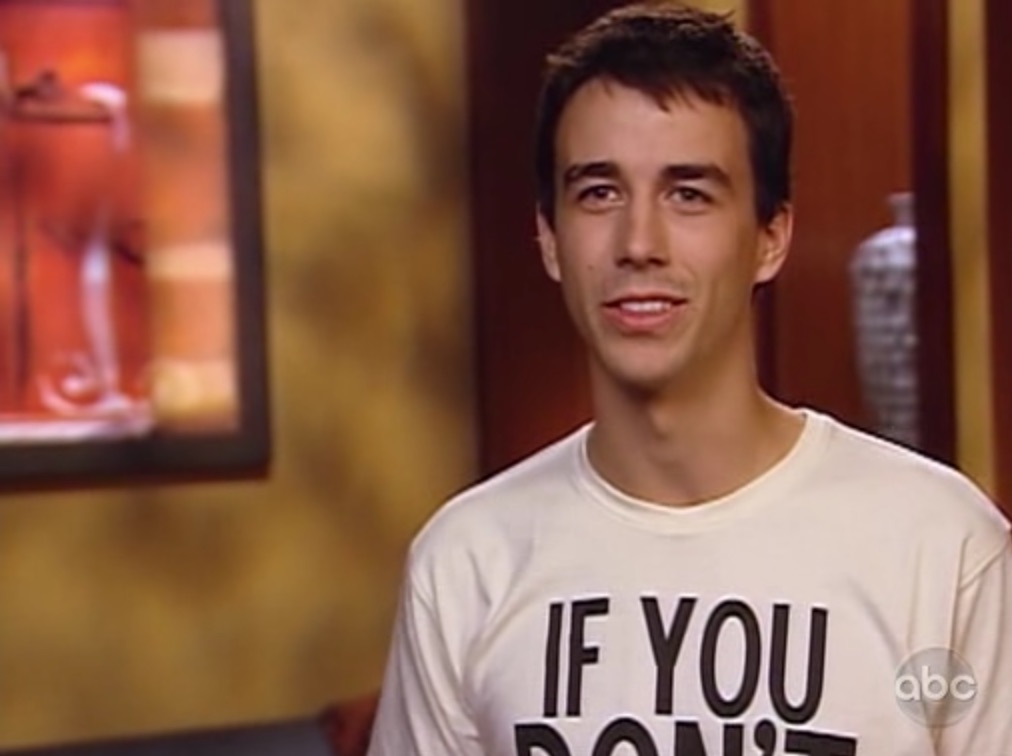
I looked smiley after my appearance, but inside, I was crushed.
When you were young, you probably had dreams of who you would become and about the career you’d have. You probably haven’t had those dreams destroyed in 15 minutes of live primetime television, broadcast to all of your friends, family, everyone you know (and ever will know, thanks to reruns and YouTube) and literally millions of others.
It messed me up for a long time - 10 years - and I’m just now getting over it and accepting what happened. I want to share my story in the hopes that will help others who’ve had a big, public failure that they felt like they’d never come back from.
How I Got Cast as the Idealistic College Kid
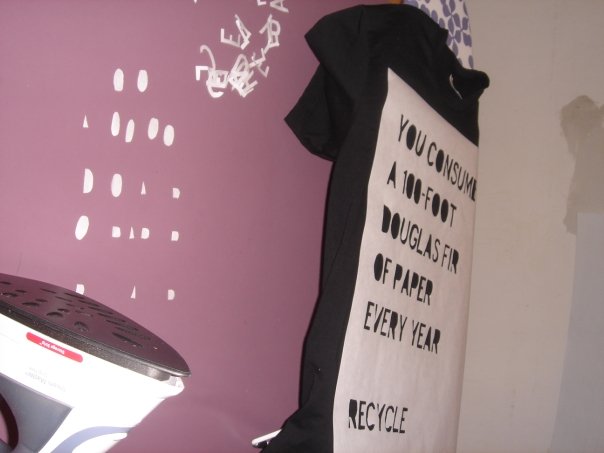
Screenprinting the original design in my dorm room in December 2008, using iron-on paper and acrylic paint. In retrospect, the designs seem a bit harsh and confrontational. 2008 was a very different time.
When I was a freshman at New York University, I started a t-shirt brand that I called The Factionist. I screen-printed socially-conscious and environmentally-friendly slogans onto some ethically-produced shirts, but I had dreams of it becoming the socially-conscious H&M. Obama had just been elected and college students in America were feeling like everything was possible, and both my own enthusiasm and the message reflected on the product reflected that.
In the spring of 2009, I was reading an entrepreneurship blog and read a post about how a “major television network” was looking for “entrepreneurs” to appear on a new reality show. They didn’t say the name of the network or the show, but this was Shark Tank (the show had not yet aired in America). I applied, and was selected by the producers to appear.
If you’re wondering how somebody would think they were an entrepreneur after painting a few t-shirts in their dorm room, you’re right. I was paying someone else to screenprint a typeface that I didn’t own onto t-shirts that I didn’t make. There simply wasn’t any intellectual property or even a business at all there. I was 19. I didn’t know what I was doing. I knew a few hundred people had paid me money for something, so that meant I had a business, right?
I had been raised by my parents to believe I was a “smart kid”, and therefore I would be successful at anything I wanted because I was smart. And, since I was genuinely gifted with intelligence, I generally did succeed a lot without really trying.
Maybe paradoxically, this caused me not to work very hard. If I had to work hard at something, I thought that must mean I was stupid or that it “wasn’t for me”. So, I didn’t work very hard on my t-shirt company. I spent most of my time doing things that college freshmen do - chase girls, go to class, and play videogames.
I would frequently pull out of activities at school that I didn’t succeed at because that lack of success conflicted with my own image of myself. I would quit teams and extra-curriculars when I started to reach the limits of my talents, rather than put in any work to improve myself. I was more concerned with looking smart than actually succeeding.
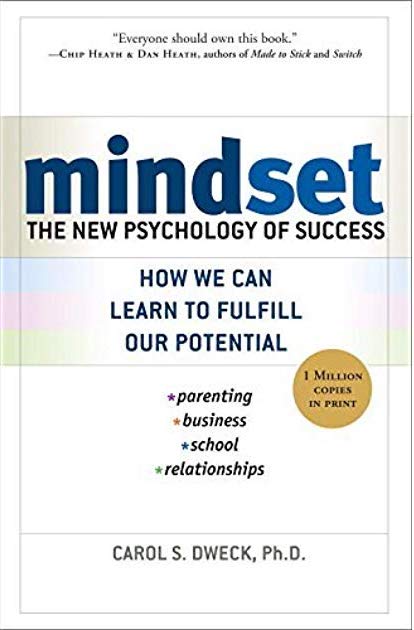
My psychologist told me to read this book - it really helped me to understand why this particular failure was so important to my ego.
Yet, I had all the confidence in the world. The mindset I had would be described by the Stanford psychologist Carol Dweck as a “fixed mindset”. Dweck described a fixed mindset this way:
In a fixed mindset students believe their basic abilities, their intelligence, their talents, are just fixed traits. They have a certain amount and that’s that, and then their goal becomes to look smart all the time and never look dumb. In a growth mindset students understand that their talents and abilities can be developed through effort, good teaching and persistence. They don’t necessarily think everyone’s the same or anyone can be Einstein, but they believe everyone can get smarter if they work at it.
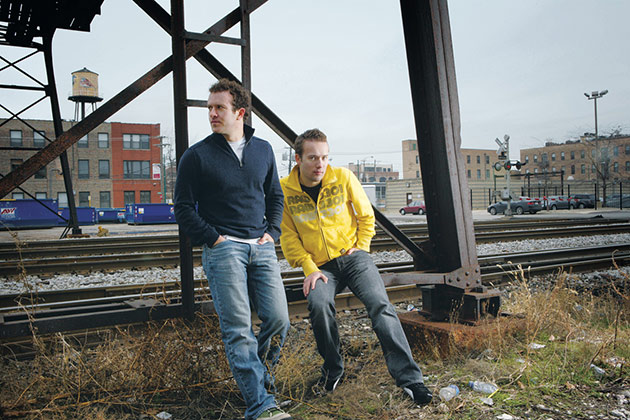
2008-era Nate’s heroes: 37signals. This image is from their 2008 Wired write-up, titled ‘The Brash Boys at 37signals […]’
I also already believed I was an entrepreneur and had made it a central part of my identity. I voraciously consumed Inc. magazine and other content around tech startups, which were taking off again as Twitter started the Web 2.0 revolution. Believing I was an entrepreneur helped me to differentiate myself from what I saw as the “worker drones” around me at business school who were gunning for a job at a big Wall Street firm.
Unstoppable Force Meets Immovable Object
Appearing on Shark Tank was putting the unstoppable force (me, the “smart kid” and self-described “entrepreneur”) against the immovable object (evaluation of my paltry “business” by a panel of experts). Failure was inevitable.
I remember being coached by Shark Tank’s producer all summer. We honed my pitch over and over. They flew me out to Los Angeles, picked up at the hotel and driving into the Sony backlot. I had to walk through the set of How I Met Your Mother to get to the Shark Tank set.
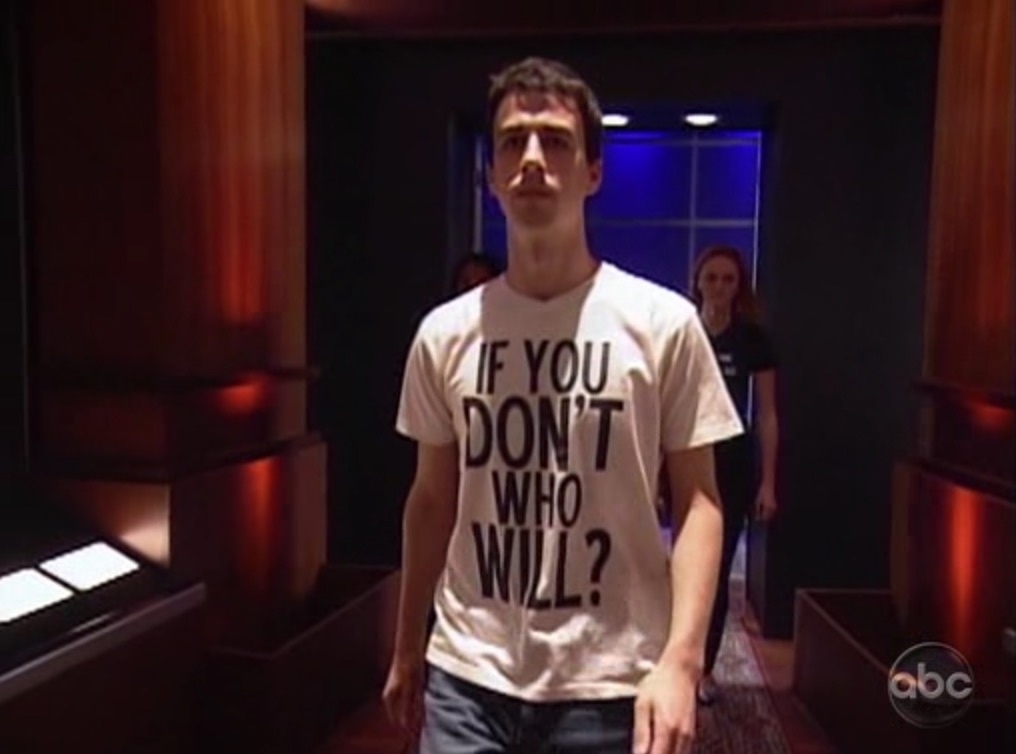
After a lot of waiting around, I was on. I walked down the forced-perspective hallway towards the sharks, trying to look confident with a Steadicam operator in my face. Then, you have to just stand there. For what felt like an eternity, I had to just stand on my mark while the camera jibs flew around and captured B-roll and shots of all of us to be cut in later.
There’s a big difference between what actually occurred next and what my memories of it were. I’ll get more into that later. But, to stick to the facts: all the sharks passed on the deal. The designated heel, Kevin O’Leary, let me know that I was a bit deluded. Extremely successful clothing brand owner Daymond John immediately pointed out the obvious flaws in my plan and how little I had accomplished to date. Robert Herjavec and Barbara Corcoran had some empathy for my obvious passion, but passed too.
The rest is a blur. I remember a mandatory meeting with a psychologist and telling her I was fine. My next clear memory is sitting at a hotel at LAX, overlooking the runways. I ordered some awful shrimp thing from room service, and sat there, alone, with my failure.
About four months later, the episode aired on national television. Shark Tank was getting about 5 million viewers 4.4 million for my episode, according to Wikipedia. per episode at the time, plus more on re-runs. I remember watching it next to my parents in their basement. I heard my entire high school watched it during classes too.
So, everyone knew I was a failure. I imagined them all laughing at me: “Hah, that guy was such a dummy! He was so unprepared! He had nothing!” “What an idiot!” “It was so obvious he had nothing, he’s so stupid!” No one ever said it to my face, but I felt like I just knew what everyone really thought. It has taken me an extremely long time to hear anyone say anything positive about my appearance actually be able to take it sincerely/at face value. 100% of the time I heard something like this, I interpreted it as a lie.
The Retreat Into The Wilderness
I bought a motorcycle that summer in an attempt to recoup some amount of my self-image of how cool I was. I studied abroad in Ghana, partly to get away from NYU where I had to face up to everyone in my class that had seen me get roasted on TV.
For the next 10 years I tried to both keep and reject my entrepreneurial identity. Founding something else was out of the question,My mindset was that I had already tried that in failed, so why try again? so I tried working in tech startups as a programmer. I would “learn on someone else’s dime”.

The original Branch team. Hursh is second from right.
During this self-imposed exile, a very good friend of mine, Hursh Agrawal, started a startup called Branch with some people he met at a startup bootcamp. A few years later, they exited to Facebook. I didn’t realize it at the time, but I really resented my friend and his success, because underneath I was thinking: “Why didn’t I do this? He was just as prepared as you are - why aren’t you doing this, like you said you would?” I buried those feelings and kept telling myself that I had to “learn more”, despite the fact that my peer was succeeding with the same amount of experience that I had.
But I couldn’t deny my entrepreneurial desires. Eventually I quit full-time computer programming work and started freelancing. This was a bit better for me, as I had to deal with sales and marketing. I found a niche in Ruby on Rails performance, and wrote a book about it that has done pretty well. In the last 3 years, I’ve cleared over $500,000 from a combination of my writings, workshops and consulting.
I still felt like a failure. 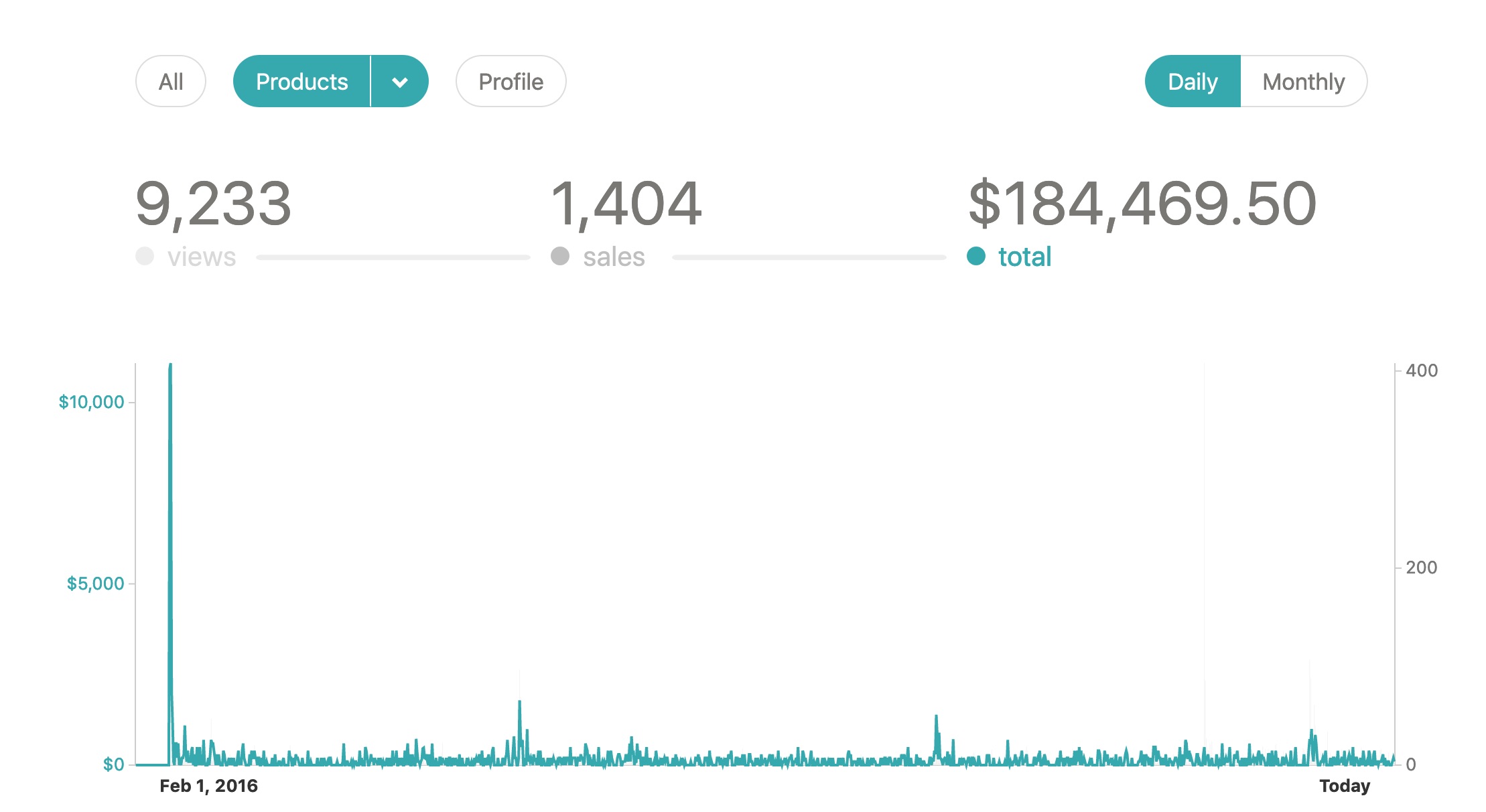
If you’ve ever wondered if you can feel like a failure while selling $1k/week in a product, yes: you can.
I was chasing various health ailments and constantly ending up at a doctor who told me nothing was wrong with me: heartburn, vague muscle aches, RSI, and more. I eventually realized what was going on and started to see a psychotherapist, which has helped me immensely.
I had to admit to myself that my health issues were caused by internal resistance and fear of failure, generated by a part of me that had never gotten over failing on Shark Tank all those years ago. My psychotherapist used mostly the Internal Family Systems method when working with me. I’ve found it very helpful. An introduction to the topic is available in Self-Therapy by Jay Earley.
Watching My Appearance, 10 Years Later
As part of the healing process, I recently re-watched my Shark Tank appearance for the first time since it aired. In almost 10 years since it went on TV for the first time, I had never seen it again.
10 years later, I didn’t want to do it. I couldn’t even push play. My skin flushed, my heart started racing.
A part of me still lived that Shark Tank experience every day. This part of me felt worthless and stupid. He felt like everyone had lied to him about who he was and what he was supposed to become. He felt like everyone was watching, ridiculing. Embarrassed, ashamed, worthless.
I pushed play. I started sweating. I was back in the room. I could see the absolute destruction of my ego in my own reaction - the slight twitch of the red eyes, the quivering expression. I was on the edge of tears for a lot of that.
But I was completely taken aback by the person I was watching on the television. It didn’t seem like me. I was shocked by my own confidence and self-belief. I hadn’t acted like that in 10 years. It seemed impossible that I was ever this 19-year-old.
At one point, it felt like I (19-year-old Nate) was talking to myself (30-year-old Nate). At the end of the segment, I said: “It’s not a mistake to have confidence in yourself”. But I haven’t had anywhere near that degree of self-confidence in almost a decade.
I even honestly assessed my own performance as it was happening - I said that I had the drive but not the real numbers and work product to show for it yet.
So many positive things happened during that segment that I don’t remember. I think I blocked them out of my memory because they didn’t fit the story of failure that I had told myself. Robert Herjavec and Barbara Corcoran, Barbara Corcoran called me after the show taped and asked me to work for her. I was an intern for her for about a year. two of the sharks, were clearly taken in by my presentation and confidence, even if the business didn’t make any sense. Robert commented at the end, after I had left the room: “See, that’s why you don’t dump on people like that. This wasn’t the right vehicle for him, but someday he’ll find the right one.”
Speaking to Myself
I can tell Shark Tank Nate that he was right about himself. You were wrong at the time. You didn’t know what you were doing. But, you did something incredibly brave by going on that show and doing what you did. And you were 19, man. No one knows anything when they’re 19! What percentage of successful business founders were fully formed at 19?
It’s not a thing to be ashamed of that you don’t have the knowledge or skills. You just have to get back up and recognize your mistakes and grow. I know that now.
I’m not a failure. I’m not smart, I’m not an entrepreneur, I’m not any of those things. I’m Nate. I’m constantly growing and changing and looking for that perfect vehicle.
So don’t be so hard on yourself, Shark Tank Nate. You did the best that you could. You weren’t set up to succeed. You didn’t understand that the fixed mindset that you had was actually holding you back. You were pushed into a brick wall. But if you get back up, even now, so many years later, it will have been worth it.
Shark Tank is the best thing that ever happened to me because it taught me how to fail. I will never have a more embarrassing, bigger failure than that. But I’ve had one, and now I’ve learned from it. Some people go through entire mediocre careers never being able to admit to themselves that what they were doing wasn’t working. Or they do, and then give up and never recover. Now, I can do something else. I’m here to recognize the mistakes, recognize the good, and move on.
Put another way, where would I be today if I hadn’t had the reality check that Shark Tank provided?
I might be in a loop of constantly “trying” but not really trying, and passing yourself off as a success because you’re too afraid to fail. Many “wantrepreneurs” end up like that - the ones that are “serial entrepreneurs” but never tell you the names of the companies. I genuinely think, had I not appeared on Shark Tank, that would probably be me. Instead, I was presented with a failure that I couldn’t hide from, couldn’t minimize, and had to accept.
Where to Now?
I’d like to think that I’m finally metabolizing what happened. Not forgetting, or trying to reject it - that obviously hasn’t worked. But metabolizing it, integrating it into myself, and realizing what that experience did for me.
I’ve had my biggest year ever in terms of revenue from self-employment. I’ll be working on doing the same for next year, but also turning my self-employment into more of a business, with processes and systems and equity. It’s exciting, and something I don’t think I’ve given myself permission to do until now.
So here’s to that exciting future that I put on the shelf ten years ago and I’m just now dusting off. And it’s thanks to Shark Tank - I wouldn’t be here without it.
Want a faster website?
I'm Nate Berkopec (@nateberkopec). I write online about web performance from a full-stack developer's perspective. I primarily write about frontend performance and Ruby backends. If you liked this article and want to hear about the next one, click below. I don't spam - you'll receive about 1 email per week. It's all low-key, straight from me.
Now Available: The Complete Guide to Rails Performance
I've authored an in-depth course for making Ruby and Rails applications faster. The Complete Guide to Rails Performance is a full-stack course that gives you the tools to make Ruby on Rails applications faster, more scalable, and simpler to maintain. It includes a 361 page PDF and over 15 hours of video content.
Learn more at railsspeed.com.